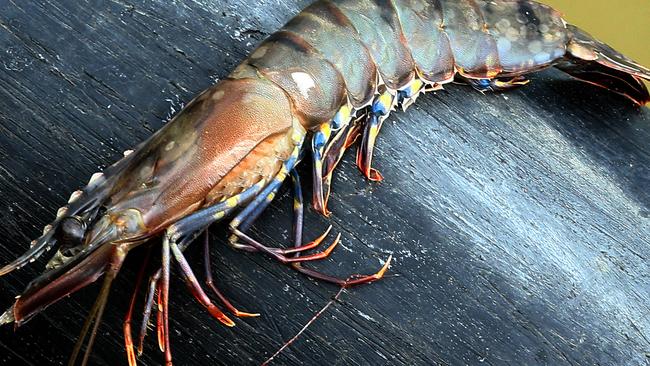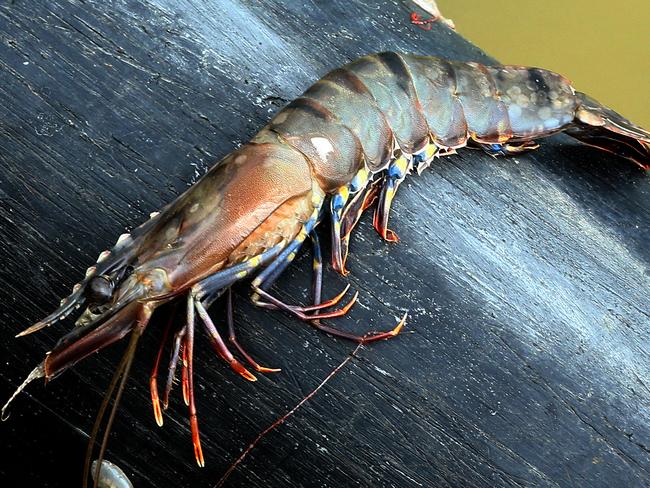Seafood industry on alert as tests show deadly white spot virus rife in southeast QLD
IMPORTED prawns infected with the deadly white spot virus are continuing to inundate Queensland, as farmers warn of the potential annihilation of our seafood industry.

QLD News
Don't miss out on the headlines from QLD News. Followed categories will be added to My News.
IMPORTED prawns infected with the deadly white spot virus are continuing to inundate Queensland, as farmers warn of the potential annihilation of our seafood industry.
The discovery two years ago of white spot – which is harmless to humans, but fatal to more than 100 species of marine animals – has already cost the seafood industry an estimated $100 million, and farmers are fearful more pain is in store.
Tests on imported prawns at four southeast Queensland retailers found up to 33 per cent of the samples were contaminated with white spot.
The University of the Sunshine Coast’s Professor Wayne Knibb, who carried out the tests, told last night’s Four Corners program on the ABC that finding any contaminated prawns was reason for concern.
Alistair Dick, the general manager of Gold Coast Tiger Prawns, said the discovery was a sign that Australia’s biosecurity systems were failing.
“It’s another example of the s---house protocols by the Department of Agriculture,” he said. “They still don’t get it.

“This isn’t just about prawns,” Mr Dick said. “There are over 100 susceptible local host species – basically, every known crustacean.
“A fisherman using frozen prawns from the supermarket to catch rock lobsters in WA could be all it takes for another widescale disaster ... It’s that serious,” he said.
Professor Knibb said the discovery was a worrying sign.
“It takes just one seed to start a new infection, so to find even 1 per cent is a concern,” he said. “It’s not going to take much to start the whole thing happening again.”
Professor Knibb said governments needed to invest to find better screening methods to stop contaminated seafood entering the country.
“At the moment, you can’t test with 100 per cent confidence unless you start grinding up every shrimp and testing every one – at a cost of a gazillion dollars,” he said.
“We need a chance to come up with new technologies ... Mother Nature doesn’t care about government policies.”
Seafood Industry Australia (SIA) released a statement in reponse to the Four Corners report on white spot virus and biosecurity. Here is the statement in full:
Seafood Industry Australia (SIA) is concerned by the findings and allegations made by Four Corners, regarding the deliberate evasion of Australia’s strict biosecurity and quarantine procedures.
“Australia’s international trade and environment is underpinned by our biosecurity system. Any business or individual breaching this system puts the livelihood of many Australians at risk. The Four Corners report raised some extremely serious allegations of this system being circumvented ” SIA CEO Jane Lovell said.
“As we saw during the 2016 white spot virus outbreak, any major biosecurity breach has the potential to wipe out an entire sector of Australia’s agriculture industry and impact the country’s economy.
“SIA is also concerned that the integrity of our biosecurity system can be compromised by insufficient resources. This is a point made by the Inspector-General of Biosecurity’s recent report into white spot.
“Without enough staff to review and revise import risk assessments, we run the risk of increasing biosecurity breaches. Global supply chains are changing rapidly in response to market pressures, diseases are changing and we must make sure we are on the front foot in this dynamic environment. Insufficient resourcing means there is increased risk from these types of diseases for not only the seafood industry, but the entire agriculture industry.
“It’s important the Department of Agriculture has sufficient resources to deal with national biosecurity issues, whether they are related to seafood, cows or crops.
“Now is not the time for cutbacks.
“Minister Littleproud’s recent announcement of increased funding for biosecurity, including marine pests, is welcome. But, the question remains whether this is enough.
“It is important to note that white spot virus poses not threat to humans.”
Originally published as Seafood industry on alert as tests show deadly white spot virus rife in southeast QLD


